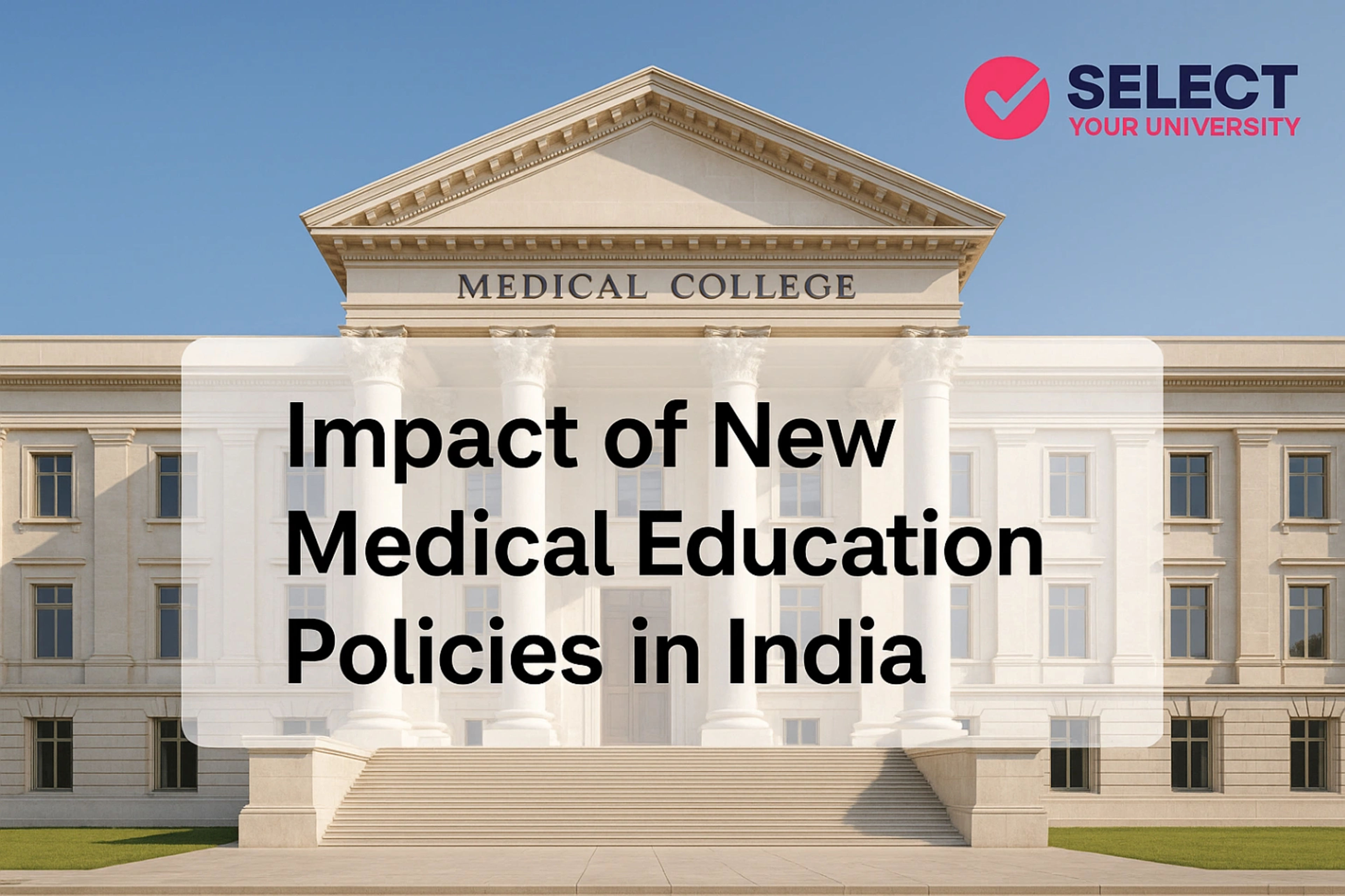Impact of New Medical Education Policies in India
 Impact of New Medical Education Policies in India
Impact of New Medical Education Policies in IndiaIndia holds the largest number of medical colleges in the world. With more than 700 medical colleges where students pursue MBBS, keeping educational policy up-to-date is important. From the number of colleges to MBBS seats in India, there are endless things to look at.
In 2025, the Indian government introduced new medical education policies for students. Under the guidance of the NMC (National Medical Commission) and National Education Policy (NEP) 2020, medical education has undergone a significant shift.
Whether you are planning to take admissions in MBBS 2025 or preparing for NEET UG for next year, these policies have an impact in different ways. Let’s understand the medical educational policy and its impact in detail.
The new medical education policy is under development under the National Education Policy (NEP) 2020.
- The school education is reforming with a 5+3+3+4 system. These include the Foundational Stage, the Preparatory Stage, the Middle Stage, and the Secondary Stage.
- The shift to conceptual learning with the integration of vocational education, sports, and more.
- The implementation of multilingual learning.
What are the new medical education policies for 2025?
The 2025 budget and new education policies have introduced various reforms as follows:
- NExT: The National Exit Test (NExT) is introduced in medical education. It is one of the major changes introduced in the education policy that will change the final MBBS examinations. The NExT is going to replace the NEET PG and FMGE(Foreign Medical Graduate Examination) by August 2025. The exam serves as a licentiate exam, final MBBS examination, and entrance for postgraduate exams. Students can take NExT twice a year rather than take NEET PG and FMGE separately.
- Extension in Medical Seats: The National Medical Commission announced additional MBBS seats for 2025. Students taking NEET Counselling 2025 for admission to MBBS have more availability of seats in government medical colleges. With over 700 medical colleges, MBBS seats in India have now increased to 115,000. Initially, only 80,000 MBBS seats were available for NEET candidates.
- AYUSH Integration: The new medical education policies encourage students to learn about the AYUSH system. In addition to MBBS, students can gain exposure to AYUSH ( Ayurveda, Yoga, Unani, Siddha, and Homoeopathy). The system does not blend treatments of modern and traditional medicine, but provides an inclusive healthcare system. Students are encouraged to learn the best of both worlds from ancient Indian medicine and modern medicine.
- Regional Language Instruction: The National Medical Commission (NMC) is promoting regional language institutions in MBBS as per NEP. Many institutions in India have started MBBS courses in local languages such as Hindi, Tamil, etc. This change is introduced to enhance access to education for rural students. Sampurnanand Medical College of Jodhpur and Medical College of Barmer are adopting the local language as a medium of instruction.
- Digitalisation: With the new medical education policies, MBBS in India is moving towards digitalisation. The government has encouraged medical colleges to adopt AI and technology for labs and clinical simulations. More than 300 colleges now include AI-driven digital anatomy.
What is the impact of these changes in medical education?
With the implementation of these changes in medical education policy in India, it's likely to impact the overall system. Here's how.
Access to education
The integration of local languages, such as Hindi, will enhance access to education. Many rural students across the nation complete schooling in local languages.
For these students, MBBS in India is a dream that has obstacles like language instruction. This change will enhance access and empower rural students with education. Students can learn and practice medicine in the local language.
Save Time
Many students taking NEET UG dream of taking admission in government medical colleges in India. However, with limited seats and cutthroat competition, many students have to change their options.
- Some either move abroad for MBBS or take alternative medical courses like BDS or BAMS to save time. So, students do not have to choose alternatives due to a slight difference in ranks or take a drop year.
- MBBS is expensive in private colleges, so alternative options become a good solution. With the increased number of seats, more students can fulfil their dream of becoming a doctor.
- In the coming years, the government is building more AIIMS to increase MBBS seats in India.
Optimum use of resources
Students with MBBS abroad wanting to practice in India or studying in postgraduate courses have to take two entrance exams- FMGE and NEET PG.
These exams are designed for medical practice licenses and postgraduate admissions in India.
With the implementation of NExT, all these have been reduced to one exam, NExT. Students do not have to take FMGE, NEET PG for license and post-graduation.
Conclusion
New Medical education policies developments under the National Education Policy (NEP) 2020 are taking a shift. The initiatives are taken by the government and medical colleges to enhance the quality of education. These changes have positive effects on the overall medical education system. In the coming years, you will witness more changes in the education system and policies.
Frequently Asked Questions (FAQs)
1. Who controls medical education in India?
Medical education is controlled by the National Medical Commission (NMC), established in 2019 by replacing the MCI (Medical Council of India).
2. What is the new education policy in 2025?
According to the National Education Policy (NEP), the education policy uses a 5+3+3+4 system for student development from ages three to eighteen.
3. What is the major change in medical education policy?
The introduction of NExT to replace NEET PG and FMGE is one of the major changes in medical education policy.